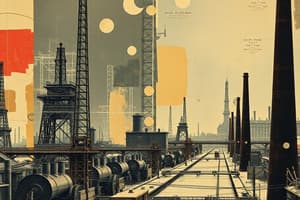Podcast
Questions and Answers
Which ideology rejected the state and its powers, arguing that all government is prone to corruption and cannot be trusted?
Which ideology rejected the state and its powers, arguing that all government is prone to corruption and cannot be trusted?
- Anarchism (correct)
- Syndicalism
- Reformism
- Marxism
What was the ultimate goal of Marxist Theory and Organization?
What was the ultimate goal of Marxist Theory and Organization?
- Abolishment of private property
- Public control of means of production and equality between men and women (correct)
- Establishment of a dictatorship of the proletariat
- Formation of alliances with socialist parties
Who predicted a peaceful takeover by Social Democrats and introduced the idea of reform through legal action rather than revolution?
Who predicted a peaceful takeover by Social Democrats and introduced the idea of reform through legal action rather than revolution?
- Karl Marx
- Eduard Bernstein (correct)
- Friedrich Engels
- Pierre Proudhon
Which type of immigrants were the largest group to emigrate overseas in the 19th century?
Which type of immigrants were the largest group to emigrate overseas in the 19th century?
In which country did Karl Marx flee to as a political refugee?
In which country did Karl Marx flee to as a political refugee?
Who argued for violence and political terror through "propaganda of the deed" but was never successful?
Who argued for violence and political terror through "propaganda of the deed" but was never successful?
What was the most important development in the Second Industrial Revolution?
What was the most important development in the Second Industrial Revolution?
What caused the separation of ownership and management in business during the Second Industrial Revolution?
What caused the separation of ownership and management in business during the Second Industrial Revolution?
Which country took the lead in industrialization during the Second Industrial Revolution?
Which country took the lead in industrialization during the Second Industrial Revolution?
What was the main impact of the split between liberal leaders and workers after 1848?
What was the main impact of the split between liberal leaders and workers after 1848?
What was the primary attraction for rapid urbanization during the Second Industrial Revolution?
What was the primary attraction for rapid urbanization during the Second Industrial Revolution?
Which innovation had a significant impact on transportation during the Second Industrial Revolution?
Which innovation had a significant impact on transportation during the Second Industrial Revolution?
What led to the rise of mass democratic parties by World War I?
What led to the rise of mass democratic parties by World War I?
Flashcards are hidden until you start studying
Study Notes
- The Second Industrial Revolution, also known as the Advanced Industrial Society, brought about new markets, a definite rise in standard of living, and expanding overseas markets.
- Industrial growth accelerated in Belgium, France, Germany, and Italy, leading to the emergence of new industries such as chemicals, oil refining, turbines, steamship building, and electricity.
- The major development of electricity provided current that could be sent anywhere, leading to the use of electricity for street lights, trams, home and factory lighting, and thousands of industrial applications.
- Energy and Industrial Research played a crucial role in the Second Industrial Revolution, with petroleum being a major source of new energy and industrial applications.
- The US led in petroleum exploration, but Germany took the lead in industrialization, with many university and private research facilities.
- The standard form of business organization shifted from private partnership or ownership to corporations, joint stock companies, and shares traded publicly, raising huge capital from investors.
- The Second Industrial Revolution brought about rapid urbanization, with attractions including industrial jobs, better education, leisure activities, and material prospects.
- Labor unions were organized to fight for labor improvements, with the British Chartist Movement being the first to legalize unions, followed by France and Germany.
- Social reforms became common, with employment security, pensions, and even health and accident insurance becoming available, although not to all workers.
- The Second Industrial Revolution also brought about mass democratic parties, with all men having the right to vote by World War I, stimulating the growth of large political parties.
- Marxism, a political ideology originating from German philosopher Karl Marx, predicted a new order (communism) as a reaction to the abuses of capitalism, with the goal of public control of the means of production and complete equality of men and women.
- The Communist Manifesto, a work by Marx and Friedrich Engels, was not taken seriously until the 1860s, with Marxist organizations growing rapidly as a voice of the workers.
- Anarchism, a political ideology that rejected the state and its powers, was a rival to Marxism, but its call for violence and political terror was never successful.
- Syndicalism, based on the idea that only workers and peasants should govern, grew as a rival to socialism in some countries.
- Reform and Revisionism were ideologies that opposed the violent revolution predicted by Marx, with the goal of peaceful takeover by the Social Democrats.
- The largest human migration in world history, known as emigration, was triggered by economic and political factors, with the US being the most popular destination for immigrants.
- Immigrants came from various backgrounds, with more literate and better-prepared immigrants going to North America, Australia, and South Africa, and less fortunate immigrants going to South America.
Studying That Suits You
Use AI to generate personalized quizzes and flashcards to suit your learning preferences.




